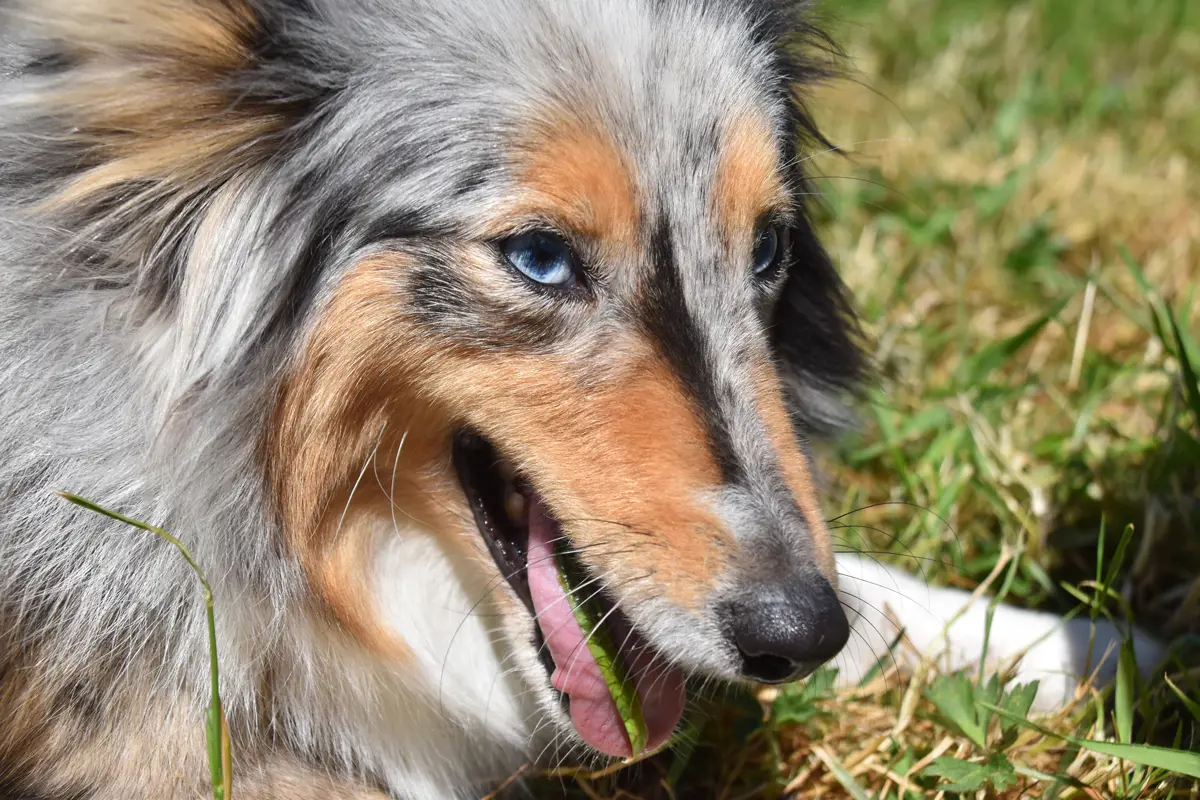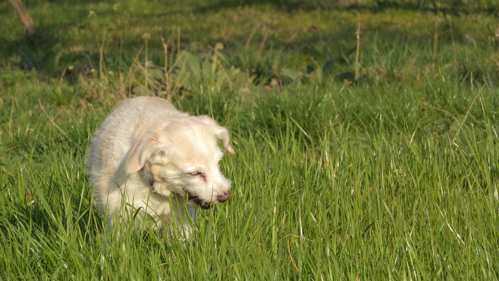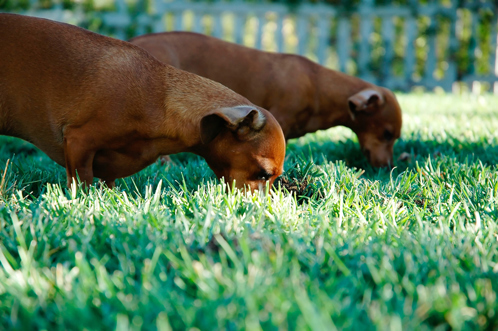Why do dogs eat grass? Exploring the surprising reasons behind this common behaviour
6th November, 2020

Life with a dog is never dull. In fact, their quirky habits can sometimes leave owners scratching their heads in puzzlement. One of the more common behaviours pet parents can encounter is their pup’s habit of eating grass. We tend to associate our canine chums with wolfing down meaty treats and biscuits rather than munching on the lawn!
If you’ve ever considered why your dog eats grass, then read our guide to this strange activity and learn how to keep them safe from harm.
Remember that, whatever the reason for your dog’s behaviour, it’s always best to have insurance for your dog in place. That way you can be confident that you can give them the medical treatment they deserve.
Why do dogs eat grass?
If your dog is eating grass, don’t worry – they’re not turning into a sheep and you’re not alone. In fact, it’s really quite common. However, no one really knows why they do it. There are some theories however.
-
Self-medication – Animals sometimes ingest certain materials to aid with digestion or to treat intestinal worms. Some dog owners believe that eating grass may be a sign your dog is feeling unwell. For example, they might be feeling nauseous and want to feel better by making themselves vomit. It’s an interesting theory but unfortunately there isn’t yet any scientific evidence to back this up.
-
It tastes good – It’s difficult to gauge whether dogs enjoy the taste of grass. But whether they’re gobbling it up in clumps or daintily nibbling on a few blades, it’s hard to think they don’t. Particularly in the spring and summer months when grass looks fresh and luscious, even to our eyes! Remember, dogs enjoy all sorts of things that might disgust the human palate – dirty socks and congealed leftovers from the rubbish bin, anyone?
-
It’s part of their natural diet – Wolves are known to eat grass as part of their diet. It might be that grass-eating is just natural behaviour passed down through the ages. On the off-chance your dog’s grass eating habit is because they are lacking in some vital nutrition, then try switching to a different dog food. High-fibre varieties in particular could solve the problem.
-
It alleviates boredom – Dogs are intelligent and sociable creatures who need a large amount of physical and mental stimulation. So, eating grass could be a sign that they’re bored and looking for something to do. Whether or not this is the case, adding some more chew toys, tossing a Frisbee or playing a ball game with your dog isn’t going to do it any harm! It’s great exercise for you both and a good opportunity for some bonding time.

Warning signs to watch out for
Having adequate dog insurance in place means that if ever you become concerned about your hound’s health, you can get professional help sooner rather than later.
The Blue Cross recommends that while grass eating isn’t usually anything to worry about, you should seek veterinary advice if:
-
Your dog is eating grass but not their normal food.
-
The grass eating becomes excessive.
-
Your dog is repeatedly eating grass and vomiting up over a period of a few hours.
-
Your dog is eating grass and doesn’t seem themselves or appears unwell.
Teething puppies need to be closely monitored as eating a lot of grass, leaves and sticks can lead to a blockage in their intestines.
If you notice your dog has been munching away on grass or houseplants, you may want to introduce natural herbs or cooked vegetables into their diet.
If you have a dog insurance policy from Purely Pets, then call our free 24-hour Vet Helpline at any time for help and advice.
All calls are handled by registered veterinary nurses with a minimum of three years of practical experience – an invaluable source of information when you’re worried.
How to keep your garden dog-friendly
Eating grass is a common and popular activity among our furry friends, but it can have its downsides. Follow these tips to make sure your pup doesn’t come to any harm:
-
Avoid pesticides – Don’t use pesticides or herbicides containing toxic chemicals that could cause irreparable harm to your four-legged friend. If you must do so, then consider making a special space in your garden that’s safe for your dog.
-
Banish poisonous plants – It’s not unusual for dogs who eat grass to try munching on other plants, too. Some common house and garden plants can be very harmful to dogs if eaten. So, avoid keeping these where your four-legged friend can reach them. Veterinary charity PDSA has a helpful seasonal list of these.
-
Clean up after your dog – Reduce the risk of parasite transmission by making sure your dog only eats grass in your own garden. Dogs can pick up something nasty from eating grass during walkies. Also be sure to clean up regularly after your dog in your garden.
-
Watch out for dangerous seeds – Foxtail grasses are lovely, decorative grasses popular in the UK. However, they can be potentially very harmful to dogs. Because the seeds are barbed to attach to animals’ fur, they can cause significant damage if they’re ingested.
-
Remove slugs and snails – Lungworm is caused by a parasitic worm commonly found in infected snails and slugs. Dogs generally become infected by this when they play with or consume them. Standard flea and worm treatments often don’t protect against this condition so talk to your vet about anti-parasite treatment.

How dog insurance can help protect your pup
Even seemingly harmless activities can sometimes lead to something more sinister, requiring professional care.
That’s why arranging dog insurance to protect yourself against unexpected costs is so important. After all, paying a regular premium is much easier than finding cash in an emergency.
It’s a great way to budget and can help cover the costs of medical care, which can be substantial.
The dedicated team at Purely Pets can help you find the perfect policy in minutes. If you take cover through us, you’ll benefit from:
-
15 levels of lifetime cover
-
Award-winning pet insurance
-
Lifetime cover up to £15,000
-
Online policy management
Get a quick quote from Purely Pets today.
Policy benefits, features and discounts offered may very between insurance schemes or cover selected and are subject to underwriting criteria. Information contained within this article is accurate at the time of publishing but may be subject to change.
Helpful Pages
Recent Posts
Pet Insurance Quote
- 98% claims paid *
- Claims paid directly to vets
- 24/7 vet video consultations
- Interest free monthly payments




